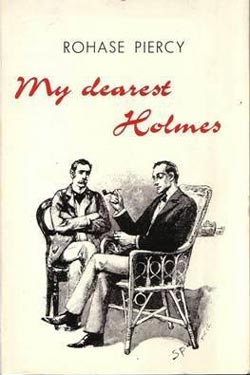
“Rescued from oblivion by Rohase Piercy,” here are two previously unknown stories about the great detective and his companion, throwing a fresh light upon their famous partnership, and helping to explain much which has puzzled their devotees. Together Holmes and Watson face disturbing revelations as they investigate the case of the Queen Bee; and we finally learn what actually happened at the Reichenbach Falls, and the real reasons which lay behind Holmes’s faked death and his subsequent return.
My Dearest Holmes by Rohase Piercy was originally published back in 1988 by GMP (the London-based Gay Men’s Press, now defunct), and has more recently been reissued by the author through Booksurge. As a longtime fan of Sherlock Holmes, and one who’s always enjoyed the various pastiche novels and stories, I was excited to learn about this short novel, which posits that Watson was in love with Holmes. Among the many extrapolations about the Holmes canon and the relationship between Holmes and Watson, it’s not an unusual idea at all, but it’s the first time I’d seen the idea so carefully fitted in and around canon. Piercy also has a dab hand with mimicking Arthur Conan Doyle’s prose style.
What was I to do? I was in love with the man. My double life, my nocturnal visits to the clubs and meeting places where I was accustomed to seek relief, had become odious and degrading to me. A clean break seemed to be the only answer, and yet I shrank from it.
The extrapolated relationship actually made sense to me, once I accepted that Watson might have preferred men to women for his sexual relationships, and works out the effects that might have on him. Piercy depicts Watson as practical and clear-headed in matters other than his love for Holmes, which requires considerable willpower to hide. Watson is never sure he has entirely managed to hide it from Holmes, but is sure that Holmes would reject him. He believes that not only society’s mores and sexual preference but Holmes’s genius and his related flaws lie between them. Holmes would be a difficult man with whom to have a romantic relationship.
I was a whetstone to his mind, I stimulated him. He liked to think aloud in my presence. His remarks could scarcely be said to be made to me—many of them would have been as appropriately addressed to his bedstead—but nonetheless, having formed the habit, it had become in some way helpful that I should register and interject. And yet when he wanted to move fast, when he wanted to dispense with the process of rhetorical question, suggestion from me, definitive answer from himself, he would completely ignore me, demand my silence, or contrive to remove my presence altogether.
… another aspect of Holmes…caused me continual sorrow. His addiction to the drug and the alarming swings of mood which it engendered had long been a source of anxiety to me, and in vain I had cautioned, threatened and entreated him upon the subject.
 These feelings, as well as legal dangers, in Piercy’s story lead to Watson’s marriage to Mary, in which Mary is in love with a woman and they provide cover for each other as well as affection. Incidentally, this also provides a reason for the one mention in canon of “Dr. James Watson” (in “The Man With the Twisted Lip”): the name is a cover for when Watson has a sexual encounter with a gentleman.
These feelings, as well as legal dangers, in Piercy’s story lead to Watson’s marriage to Mary, in which Mary is in love with a woman and they provide cover for each other as well as affection. Incidentally, this also provides a reason for the one mention in canon of “Dr. James Watson” (in “The Man With the Twisted Lip”): the name is a cover for when Watson has a sexual encounter with a gentleman.
Holmes is not pleased with the marriage, but Watson feels it is necessary to protect them both from social and legal scrutiny.
Time and marriage had not altered my feelings for him; and I, grasping at straws, was pleased to read in his minute observations of me, his constant reminders that he ‘knew my habits’, the confidence and alacrity with which he summoned me from my home and work, and even in his unreasonable jealousy of poor Mary, a sign of that affection for me which he had never allowed himself to express.
However, the supposed death of Holmes in “The Final Problem” and Mary’s death lead to Watson rethinking what he truly desires, and when Holmes is restored to him, he has the courage to speak.
‘Did you think I was anything other than destroyed already?…Did you think that I cared for my reputation, when one word—one note, one token, could have let me know, oh God, that you were still alive? How could you, how could you, when you knew—that I loved you?’
Piercy’s story has a happy ending. I am not sure how such a relationship would have happened had it taken place in real life, or in the Holmes canon, but I enjoyed traveling this alternate road for a time.
Victoria Janssen is the author of three novels and numerous short stories. She has a World War One-set Spice Brief out in May titled “Under Her Uniform,” a tie-in to her novel The Moonlight Mistress. Follow her on Twitter: @victoriajanssen or find out more at victoriajanssen.com.
Read all of Victoria Janssen’s posts for Criminal Element.
Check out all of our Sherlockiana!
